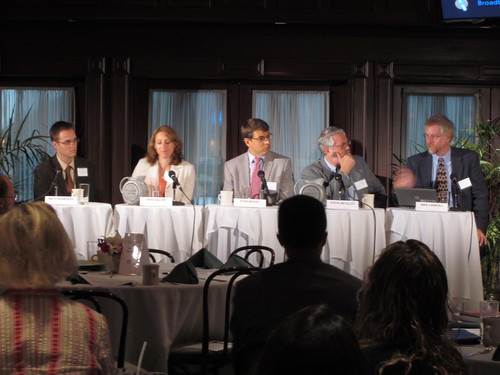Tech and Content Industry Still at Loggerheads Over Anti-Counterfeiting Trade Deal
WASHINGTON, July 13, 2010 – Major U.S. technology companies are worrying over an international trade agreement currently under negotiations because they see it as putting them on shaky legal ground. At the third Intellectual Property Breakfast Club held by BroadbandBreakfast.com, panelists argued o
WASHINGTON, July 13, 2010 – Major U.S. technology companies are worrying over an international trade agreement currently under negotiations because they see it as putting them on shaky legal ground.
At the third Intellectual Property Breakfast Club held by BroadbandBreakfast.com, panelists argued over the Anti-Counterfeiting Trade Agreement and its potential impact on the technology industry.
DLA Piper Counsel Heidi Salow said the United States via the agreement could be exporting the most stringent penalties for violating America’s digital copyright law, but not some of the exceptions favored by the tech industry.
Matthew Schruers, senior counsel for litigation and legislative affairs for CCIA, said internet users could be convicted of infringement crimes in other countries for activity that would be legal in the United States.
However, Stanford McCoy, assistant U.S. Trade Representative for Intellectual Property, said there is a long list of reliefs a company can seek under international criminal and civil law.
McCoy said of his work on ACTA that safe harbors are a critical balancing element, but that ACTA was not the right vehicle to address substantive copyright infringement issues.
ACTA is necessary because the United States cannot do it alone, he said, adding that cooperation between governments is also needed.
Because of the difference in legal systems, McCoy said the countries involved in the agreement couldn’t reach consensus on the issues such as fair use.
Steve Metalitz, counsel for the International Intellectual Property Alliance, said, “I just don’t think that there is any realistic hope that our trading partners in other countries will take up the fair use doctrine.”
McCoy said the Obama administration remains committed to getting a deal done by the end of the year.

Mike Carroll, professor of law and director of the Program on Information Justice and Intellectual Property at American University, said internet service providers would have to change some of their business practices in order to have legal certainty in other countries.
ACTA is mislabeled as an anti-counterfeiting trade agreement because it covers not only counterfeit but also piracy, he said.
Metalitz said the goal of ACTA seems to be to bring together likeminded countries that will put together a statement of best practices each country has found, and laws they can enact.
Metalitz said it is just the nature of the beast that any international agreement is going to be more general. “There are countries with different legal systems sitting at the same table,” Metalitz said.
Outside the law, pirates account for billions of dollars in entertainment industry losses according to a study cited by McCoy from the Organization for Economic Cooperation and Development.
Schruers still said there should be particular penalties consistent across the globe, but each country could decide how to use that that penalty.
McCoy concluded by saying, “I think that ACTA will not be all things to all people,” and that negotiators are striving for an agreement reflecting the balance in U.S. law.










Member discussion